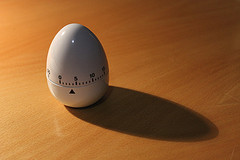
Why Doing Non-Productive Things Are Necessary To Productivity
Mondays are productivity days at SimpleProductivity blog.
I was going through a lot of stress. I was effectively being a single parent at the time, managing the Girl Scout troop essentially on my own, taking care of the house and the animals (two of whom had “issues”) and a hectic time at work.
I was complaining to a friend of mine that all I could seem to do was read. I would sit down for the 30 minutes I allot myself for any activity I choose every day, and I was reading four or five hours. (And I will admit, this wasn’t quality reading. Think brain candy.) I was frustrated that I wasn’t getting things done, but I couldn’t seem to stop the non-productive stuff.
My friend waited until I took a breath and said, “You’re doing it because you need it on some level.” She went on to explain to me that I had pushed myself so long and so hard that my brain was telling me I needed a break. She compared it to a stress injury, saying that I needed time to heal and rejuvenate, and that it was necessary to take that time or I would risk further shut down. I needed this to escape from the real world for a little while as I rested.
It brought me up short, and made me think about how being non-productive is actually necessary at times.
This Is Not Habitual
I am not making the case that this type of behavior is OK all the time. One key feature is that this is not habitual. Escapism, when it is consistent and constant, signals that there are deep problems. A temporary descent into escapism is a way to deal with overwhelming stress.
This Is Not Procrastination
This is also not merely a way to put off doing something. While other things do get put off as a result, it doesn’t have the same feel as procrastination, where you actively try to avoid doing something. Non-productive spurts happen and things are put off as a result of the time not being there.
This Is Not Destructive
My friend also pointed out that this escape was not destructive. I wasn’t trying to bury the stress in excessive exercise or food or numbing agents. My brain was simply taking a break. One way that I knew it wasn’t destructive is I developed a taste for literature I would normally not find attractive, but it was easy to read and required no thought or effort.
This Doesn’t Last Forever
Slowly I emerged from this cocoon. I tired of reading, and I went back to doing other things. At the same time, I knew I had to redo and shift parts of my life, so I did a mini-reboot.[insert link] It took about three weeks for me to work through it, and I was better off for not fighting it.
How To Recognize The Need
The key for me was recognizing when I was in it. I needed an outside opinion of a trusted friend to help me work through what I was doing, and how I was doing it. For me, the need originated in the fact that I was overworked, overwhelmed, and isolating myself from my support network. So when I looked at the causes, I was able to see that this was a stress injury of my mind.
How To Keep From Going There
The other thing I learned from this is that by being aware of what is going on in my life, I can keep from going there. Just like paying attention to pain from exercise, I can see the mental fatigue that brings this on, and take corrective action. Here are some ways that I make sure I don’t get there:
- I get enough sleep
- I exercise every day
- I make sure to eat well and stay away from sugar and chemicals
- I call friends several times a week, email others daily, and have lunch with a friend at least once a week.
- I make sure that I plan the next day, and realize my limits
- I don’t try to get everything done
- I cut myself some slack if I am feeling particularly worn out or stressed.
In the end, I learned some things from my reading spurt. I learned that my mind is just as vulnerable to stress injury as other parts of me, and that I have to take care of it. I also learned that sometimes it is necessary to do non-productive things to maintain productivity.
Photo by faith goble. Licensed under Creative Commons.




